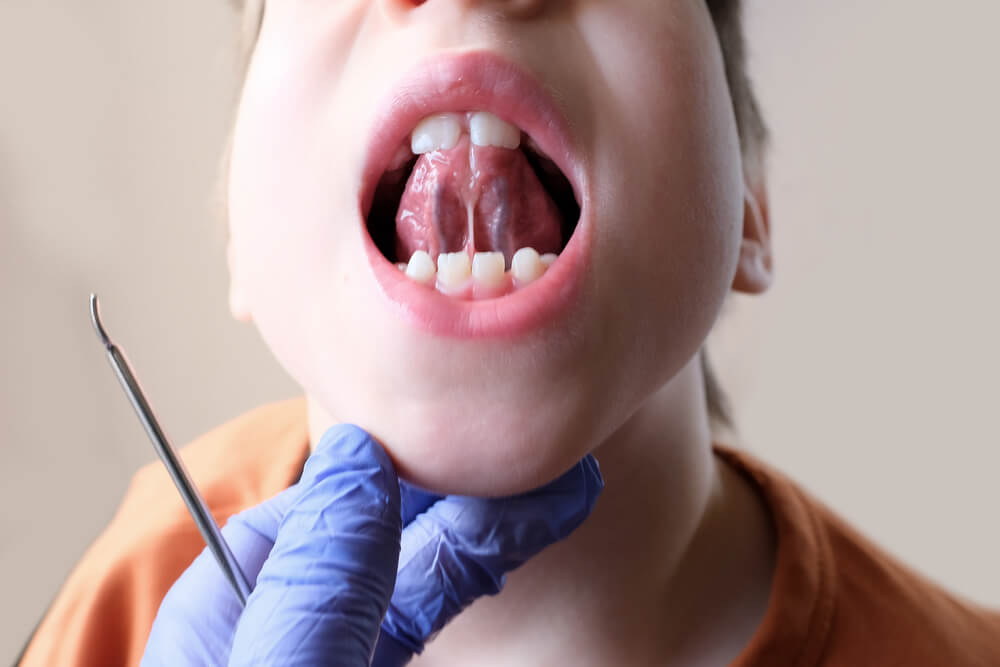Troubled By Tongue-Tie? Talk To Us!

Tongue-tie, also known as ankyloglossia, is a medical condition in which the strip of skin connecting the tongue to the bottom of the mouth is shorter than usual. This can cause numerous problems for the sufferer, but treatment options are available.
While there are no exact figures for the number of children born with tongue-tie each year, current estimates range from 3% to 5% of infants. Alarm bells are generally sounded if it’s observed that the infant isn’t latching well while breastfeeding or isn’t gaining weight. However, these can also signify other issues. If these are noticed in tandem with the child’s tongue not being able to move from side to side, or if the child can’t stick their tongue out beyond their gums, it’s possible the child was born with a tongue-tie. Diagnosis is as simple as having a doctor, dentist, or lactation consultant look in the child’s mouth, and examine the frenulum – the strip of tissue connecting the tongue to the floor of the mouth. If a diagnosis is missed during early childhood, there are additional symptoms noticeable in older children.
Tongue Tie Symptoms in Older Children
If a diagnosis in infanthood was missed, there are other factors to watch for in older children that could signify a tongue-tie problem. Difficulty in communicating or enunciating certain sounds is common. Also, frequent gagging or even choking while eating and drinking. Snoring is also a warning sign that something could be amiss. However, one of the signs that we at Future Dental are most familiar with is poor oral hygiene. For older children or adults who went untreated, the lack of tongue mobility often results in cavities or gingivitis (or other gum diseases). This is due to their inability to sweep away any remaining food particles or debris. If you or your child is displaying symptoms of tongue-tie, never fear. At Future Dental, we use the very best in high-tech treatment to rectify this condition.
Treating Tongue-Tie at Future Dental
We are lucky enough to have the expertise of Dr Bob Gibbins on our team. Dr Gibbins is an expert in treating tongue-tie using the Waterlase Laser. He is the only dentist in the entirety of the northern half of Queensland who can claim almost 20 years of experience in this area. Not only that, but Future Dental is the only dental practice in North Queensland that offers tongue-tie treatment using the Waterlase Laser.
What Is The Waterlase Laser?
There are a variety of different ways that medical professionals treat tongue-tie. Frequently, all that is used is a sharp pair of surgical scissors, and the frenulum is snipped to allow the tongue more movement. However, it can unsurprisingly cause pain, bleeding, and swelling. It may also require stitches after the fact. A far better option is the Waterlase Laser.
The Waterlase Laser is used to cut the frenulum in the same way that scissors or a scalpel would, but with several key differences. The Waterlase Laser is gentle and doesn’t use intense heat. Thus, there is no risk of charred tissue, unlike with CO2 lasers. Additionally, it seals blood vessels as it cuts. This will keep bleeding to a minimum. The lymphatic vessels are also sealed during the process, which mitigates post-operative swelling. One of the biggest factors that place the Waterlase Laser above any other treatment option is that the Laser sterilises as it goes. This cuts down the risk of infection. Another factor is that it causes minimal pain to the patient. Indeed, we use the Waterlase Laser on infants who mostly seem to complain about being held firmly by their caregivers during the procedure.
How Can We Help?
If you suspect that you or your child may have a tongue-tie, please make an appointment to come and see us! Dr Gibbins is ready and waiting to use his years of experience to treat you and your family with our high-tech and wonderful Waterlase Laser. You can expect a minimally invasive procedure with almost no downtime or discomfort. You can look forward to licking ice creams with nary a care in the world.
For more information about how we treat tongue-tie, please see here.
To book an appointment, please use this contact form, or call us at (07) 4051 4580.



